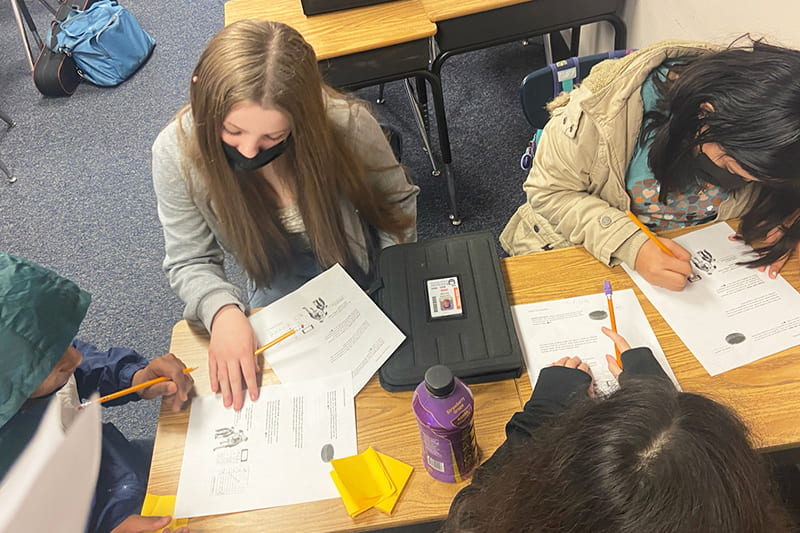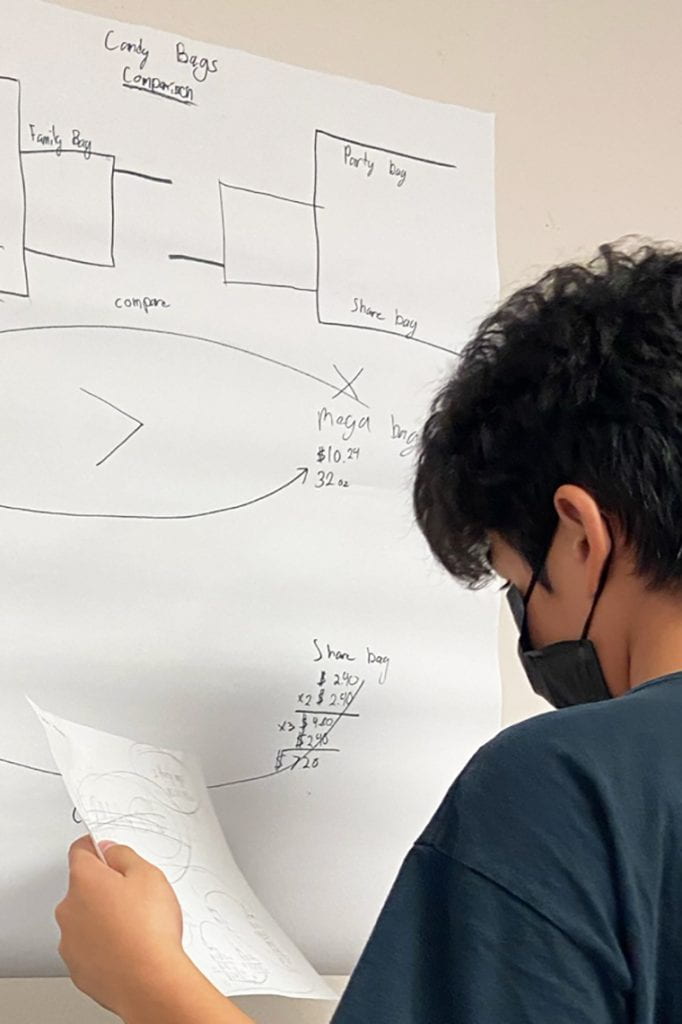There are no worksheets in Rachel Thomas’ sixth grade math class at Ritenour Middle School.
They don’t memorize formulas, either. Even more impressive is the way students rally around one another as they tackle the latest high-level math problem that Thomas has thrown their way. They’re in this together.
“The focus on high-level tasks has really changed my classroom,” says Thomas, a nine-year teaching veteran who switched from fifth to sixth grade right before the pandemic. She admits that getting everyone reacquainted with in-person learning at the top of this school year took a few weeks, but the students hit their stride early on, thanks to changes she’s made to their work. She didn’t make it easier. Instead, she’s intentionally made the work more complex and challenging. Upping the ante was just what they needed.
“When we break out into smaller working groups, I walk around and hear their conversations. They really are teaching one another. If they see a classmate struggling, they reach out to help. The students really want to see each other succeed.”
Rachel Thomas, sixth grade teacher at Ritenour Middle School
Thomas credits the positive shift in her classroom to her district’s embrace of math teaching through high-level tasks. The welcome change was ushered in through a district immersion effort spearheaded by the Institute for School Partnership (ISP). The STEMpact District Immersion project is energizing math teaching teams in the Ritenour, Mehlville and Maplewood Richmond Heights School Districts.
The three-year pilot is an opportunity for districts to bring ISP’s seasoned math instructional experts alongside their teams for a deep dive into math instruction system-wide. ISP and all three participating districts shared an aim for Spring 2023: measurable improvement in math outcomes for all students, with a laser focus on narrowing the MAP test score-gap for underperforming students.
With the project’s second year coming to a close soon, Thomas is confident that her students are test-ready. They are already demonstrating gains in the monthly assessments and are eager to see their own progress.

“The kids are authentically onboard. I have the pleasure of watching them grow, challenge their own misconceptions, and use mathematical and educational vocabulary to articulate how they arrive at an answer. Sometimes I’m so excited, I have to stop and record what’s happening with my camera! This opportunity with ISP came at the right time in my career. It’s exactly what I wanted for myself and my students,” she says.
Confident teachers, confident students

“By the time students reach middle school, they already know if they are good at math or not,” says Mandy Harvell, Secondary Instructional Coach for Math in the Ritenour School District. “We’ve worked really hard over the last several years to develop a growth mindset around math.”
The only math-specific coach in the district, the former middle school math teacher knows exactly the challenges that come with teaching math to middle school students.
“For sixth, seventh and eighth graders, one challenge with math learning is simply navigating what they are going through with their emotional and physical development,” says Harvell. “We are innovating, trying new things and constantly learning.”
One of the most valuable components of the district immersion work, Harvell says, is the opportunity to connect regularly with peers doing the same work with ISP. This model, known as a Networked Improvement Community (NIC), is a formalized way for educators to compare notes, share hits and misses, and support one another as professionals.
“Even though Mehlville and Maplewood Richmond Heights districts are very different from us in size, resources available and students we serve, there are some very clear commonalities,” she says. “We’ve built a community.”
Abby Smith, PreK-6 Math Instructional Coach and Coordinator for the Maplewood Richmond Heights District agrees.
“The NIC is a wonderful opportunity to learn from peers in other districts who are facing some of the same drivers and challenges,” says Smith, who is also enthusiastic about the project’s Learning Labs, an opportunity for teachers to take a guided, lesson and task-specific drill-down together with an ISP coach, and observe one another in a classroom setting.
“A lot of times, when organizations make a plan for change, there is a lot of energy during the planning phase, but things start to break down or lose steam when it’s time to implement,” adds Smith. “If we get in that rut, ISP is here to help us build in the time and space we need to look at what the data is telling us. Working with ISP provides that consistency and holds us accountable in a good way because we’re in the weeds. Building in that time for reflection and follow-up is worth the effort.”
Smith says even when the district immersion work with ISP is finished, the Maplewood Richmond Heights District will own a set of best practices that will ultimately benefit students.
“As early childhood and elementary teachers, we play a key role in helping students develop a healthy math identity,” she says. “We provide our teachers with extensive professional development and opportunities to do math themselves, so they can present a positive experience for our students.”
Media Contact: Anne Heinrich